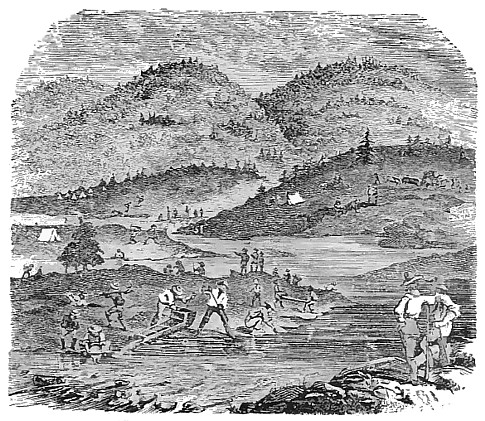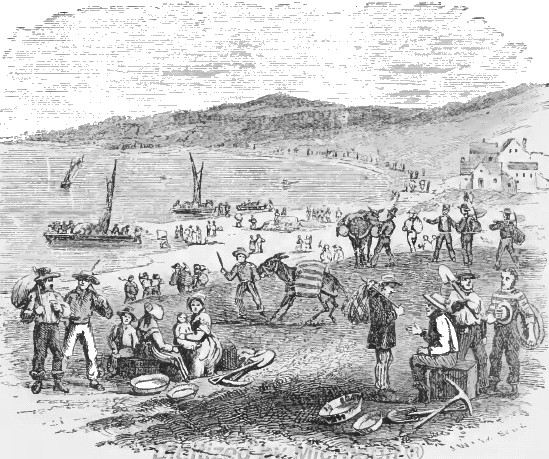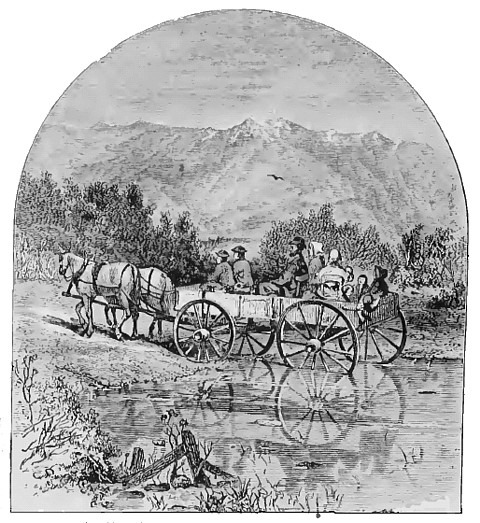This, the first printed notice of the discovery, ran as follows: “Gold mine found. In the newly made raceway of the saw-mill recently erected by Captain Sutter on the American fork, gold has been found in considerable quantities. One person brought thirty dollars worth to New Helvetia, gathered there in a short time. California no doubt is rich in mineral wealth; great chances here for scientific capitalists. Gold has been found in every part of the country.” The Californian newspaper of April 1st had merely mentioned the rumored gold discovery and treated it as of no importance. The rumor was that a gold-mine had been discovered at Sutter's sawmill. Shortly afterward the editor left to get what news there might be, at first hand. He visited the original "mine," escorted by Sutter himself, but returned to tell his public that it was all a sham, and advised them to stay at home and stick to business. His assessment was wildly incorrect (yes the newspaper does often get it very wrong). A few weeks later he was forced to close his printing-office, as there was not a man left in Yerba Buena to set the type or print the paper.
It did not take long, and nearly everybody had gone off to the mines; the towns were all substantially deserted; and no one cared anything more about the local news or stimulating immigration. The immense wealth of the gold-fields and the almost fabulous returns for labor were sufficient attractions to soon fill the country; and the promised second extra not only never appeared, but the newspaper itself was obliged to stop its publication for want of hands to get it out.
There were men, however, more observant and outspoken than the astute editor, some of whom left town singly, or in small parties of seldom more than two or three. They said little, as if fearing ridicule, but crossed quietly over to Sauzalito, and thence took the direction of Sonoma and Sutter's Fort. The mystery of the movement in itself proved an incentive, to which accumulating reports and specimens gave intensity, till it reached a climax with the arrival of several well laden diggers, bringing bottles, tin cans, and buckskin bags filled with the precious metal, which their owners treated with a familiarity hitherto unknown in these parts to such worshipful wealth. Among the new comers was Samuel Brannan, the Mormon leader, who, holding up a bottle of dust in one hand, and swinging his hat with the other, passed along the street shouting, "Gold! Gold! Gold from the American River". This took place in the early part of May. The conversion of San Francisco was complete. Those who had hitherto denied a lurking faith now unblushingly proclaimed it; and others, who had refused to believe even in specimens exhibited before their eyes, hesitated no longer in accepting any reports, however exaggerated, and in speeding them onward duly magnified. Many were thrown into a fever of excitement, and all yielded more or less to the subtle influence of the malady. Men hastened to arrange their affairs, dissolving partnerships, disposing of real estate, and converting other effects into ready means for departure.
On May 29, the Californian announced that it was compelled to suspend as all its employees even down to the printers' devil had struck work and gone off to the diggings. The whole country, it said, from San Francisco to Los Angeles resounded with the sordid cry of gold! gold!! gold!!! The field was left half planted; the house half built; everything was neglected but the manufacture of shovels and pickaxes and the procurement of means of transportation to the auriferous hills where one man alone had made a hundred and twenty-eight dollars worth of the "real stuff" in one day's washing and the average for all concerned was twenty dollars a day. The editor, informing the world that his paper " could not be made by magic, and the labor of mechanism was as essential to its existence as to all other arts:" and as neither men nor devils could be kept to service, the wheels of progress here must rest a while. So also came to an end for a time the sittings of the town council. All through the Sundays the little church on the plaza was silent, and the services of the sanctuary, all having gone away after other gods. On June 14 the California Star also suspended, and for the same reasons. Nearly everybody had left the town. The prices of real estate and all other species of property, except mining tools and provisions, fell to exceedingly low figures; and great sacrifices were made, wherever any one was found willing to invest, to procure means to reach the mines.
The Californian, published at San Francisco on the 14th of August, furnishes the following interesting account of the Gold Region: "It was our intention to present our readers with a description of the extensive gold, silver, and iron mines, recently discovered in the Sierra Nevada, together with some other important items, for the good of the people, but we are compelled to defer it for a future number. Our prices current, many valuable communications, our marine journal, and other important matters, have also been crowded out. But to enable our distant readers to draw some idea of the extent of the gold mine, we will confine our remarks to a few facts. The country from the Ajuba to the San Joaquin rivers, a distance of about one hundred and twenty miles, and from the base toward the summit of the mountains, as far as Snow Hill, about seventy miles, has been explored, and gold found on every part. There are now probably 3000 people, including Indians, engaged collecting gold. The amount collected by each man who works, ranges from $10 to $350 per day. The publisher of this paper, while on a tour alone to the mining district, collected, with the aid of a shovel, pick and tin pan, about twenty inches in diameter, from $44 to $128 a day—averaging $100. The gross amount collected will probably exceed $600,000, of which amount our merchants have received about $250,000 worth for goods sold ; all within the short space of eight weeks. The largest piece of gold known to be found weighed four pounds. "Labor has ever been high in California, but previous to the discovery of the placer gold, the rates ranged from $1 to $3 per day. Since that epoch common labor cannot be obtained, and if to be had, for no less price than fifty cents per hour, and that the most common. Carpenters and other mechanics have been offered $15 a day, but it has been flatly refused. Many of our enterprising citizens were largely engaged in building, and others wish to commence on dwellings, warehouses, and the like, but all have had to suspend for the lack of that all important class of community, the working men." The following extracts from the published journal of a physician in California, give accounts of the reception of the news of the gold discovery in San Francisco, with its consequent effects.
"May 8th.—Captain Fulsom called at Sweeting's to-day. He had seen a man this morning, who reported that he had just come from a river called the American Fork, about one hundred miles in the interior, where he had been gold washing. Captain Fulsom saw the gold he had with him ; it was about twenty-three ounces weight, and in small flakes. The man stated that he was eight days getting it, but Captain Fulsom hardly believed this. He says that he saw some of this gold a few weeks since, and thought it was only “mica”, but good judges have pronounced it to be genuine metal. He talks, however, of paying a visit to the place where it is reported to come from. After he was gone, Bradley stated that the Sacramento, settlements, which Malcolm wished to visit, were in the neighborhood of the American Fork, and that we might go there together ; he thought the distance was only one hundred and twenty miles.
"May 10th.—Yesterday and to-day nothing has been talked of but the new gold “placer,” as people call it. It seems that four other men had accompanied the person Captain Fulsom saw yesterday, and that they had each realized a large quantity of gold. They left the 'diggings' on the American Fork, (which it seems is the Rio de los Americanos, a tributary to the Sacramento) about a week ago, and stopped a day or two at Sutter's Fort, a few miles this side of the diggings, on their way ; from there they had travelled by boat to San Francisco. The gold they brought has been examined by the first Alcalde here, and by all the merchants in the place. Bradley showed us a lump weighing a quarter of an ounce which he had bought of one of the men, and for which he gave him three dollars and a half. I have no doubt in my own mind about its being genuine gold. Several parties, we hear, are already made up to visit the diggings; and, according to the newspaper here, a number of people have actually started off with shovels, mattocks, and pans, to dig the gold themselves. It is not likely however, that this will be allowed, for Captain Fulsom has already written to Colonel Mason about taking possession of the mine on behalf of the government, it being, as he says, on public land.
"May 24th,—This place is now in a perfect furor of excitement ; all the work-people have struck. Walking through the town to-day, I observed that laborers were employed only upon about half-a-dozen of the fifty new buildings which were in the course of being run up. The majority of the mechanics at this place are making preparations for' moving off to the mines, and several hundred people of all classes—lawyers, store-keepers, merchants, &c.,—are bitten with the fever ; in fact, there is a regular gold mania springing up. I counted no less than eighteen houses which were closed, the owners having left." There was no telegraph wire in California, nor even a pony express, but it would seem that the word "GOLD " was carried on invisible waves and shouted into every ear. The large merchants closed their warehouses for want of laborers, and the small ones left their shops in charge of their wives, if they had any, or merely turned the key; mechanics threw down their tools, bought a pick, shovel, and pan and shouted that they'd work for other men no more; farmers left their crops to rot in the fields; the editors followed their printers. The great ranches were deserted, for even the indolent Californians and their Indians were dazzled by the hope of sudden wealth, or by that subtle and deadly magnetism which emanates from the metal. By July the whole territory was at the mines or marching there, some in the family coach, many on horseback, more on foot, others by sloop to the embarcadero near Sutter's Fort. The ranch-houses looked like the castles of Europe in the Middle Ages, when all the men were at the wars and the women stayed at home to spin.
The mania continued to increase, and within a few months all the principal towns were nearly emptied of their population. Gold was the universal object, and splendid and rapid fortune the universal hope. No occupation seemed to offer such a prospect as that of digging gold, and, accordingly, those who were not able to bear the fatigues of such Work, or were at the head of any sort of business in the different towns, had to pay enormous prices for the labor of subordinates who performed the meanest services. The prices of all agricultural and manufactured products became treble the previous rates.
For a time the excitement was confined to California. There were rumors in the East; but, long before she took the discovery seriously, and men scrambled to the ports of the sea, to travel to the placer mines; Not long afterward came the first waves of the tide of emigration that was to flood the placers of the gold region. The first influx consisted of Mexicans of the province of Sonoma, Chileans, and some few Chinese. These, principally took possession of the southern mines, or those on the San Joaquin and its tributaries. Some few stopped at San Francisco, and secured lots of ground which they knew would become very valuable in a short time, and erected temporary stores and dwellings. This gave the impulse to the progress of the town, and it soon advanced rapidly in size and population. Then came the emigration from the Atlantic States of the Union, and the whole territory felt the progressive and enterprising spirit of the gold seekers.
The Americans generally took possession of the mines upon the northern tributaries of the Sacramento River ; but as their numbers increased they pushed towards the southern mines, and frequent collisions with the foreigners were the consequence. Finally, a great number of the latter were compelled to leave the country. " The newspapers frequently relate instances of the return of individuals with considerable sums of gold. Many of these are much overrated, and the far greater number obtained it by other means than digging with their own hands—one portion by honest trading; but much of the hard-earned treasure in the hands of returned individuals has been borne off in triumph, and brought home as the spoils of the conqueror, in contests where honor belongs to neither winner nor loser."
Representations from and about California are to be received with many grains of allowance. The preternatural excitement which has been produced by divei's causes, in some cases to promote individual benefit, has really impaired to a large extent the faculty of seeing things as they would otherwise have been viewed. And there is yet no prospect of an end to this state of things, because, as soon as the public mind begins to recover from the effects of previous causes of undue excitement, additional ones are presented in the shape of most exaggerated accounts of golden discoveries. Whether the public good will be promoted by this state of things may well be doubted. A reference to some of these causes it is proper to give. "Divesting the newspaper accounts from California of certain expressions bordering rather too much upon the hyperbolic order, they amount to the fact that the outcrops of certain veins"—of gold-bearing quartz—" have been removed. Such expressions might have materially increased the fever but for the frequency of similar causes, which at length but slightly affect the body politic, because, like the body corporate in certain cases, it is becoming acclimated. Some of the expressions alluded to, and copied from California papers into our own, about gold bearing quartz said to he found in inexhaustible masses or quarries through the whole mountainous region which forms the western slope of the Sierra Nevada, and ' these quartz mountain quarries, and divers others, are indicative of a state of gold-mania. Accounts are also given of the yield of gold said to be averages of these great gold quarries. That the specimens from which the gold was extracted contained the stated proportions is most likely, but that is a very different affair from the average rate of productions of a vein."
Return To The Main Page: California Gold Rush: True Tales of the 49ers



